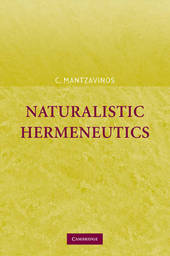
|
Naturalistic Hermeneutics
Paperback / softback
Main Details
| Title |
Naturalistic Hermeneutics
|
| Authors and Contributors |
By (author) C. Mantzavinos
|
| Physical Properties |
| Format:Paperback / softback | | Pages:200 | | Dimensions(mm): Height 229,Width 152 |
|
| Category/Genre | Social and political philosophy |
|---|
| ISBN/Barcode |
9780521109581
|
| Classifications | Dewey:121.686 |
|---|
| Audience | | Postgraduate, Research & Scholarly | |
|---|
| Illustrations |
Worked examples or Exercises
|
|
Publishing Details |
| Publisher |
Cambridge University Press
|
| Imprint |
Cambridge University Press
|
| Publication Date |
16 April 2009 |
| Publication Country |
United Kingdom
|
Description
Naturalistic Hermeneutics, first published in 2005, proposes the position of the unity of the scientific method and defends it against the claim to autonomy of the human sciences. Mantzavinos shows how materials that are 'meaningful', more specifically human actions and texts, can be adequately dealt with by the hypothetico-deductive method, the standard method used in the natural sciences. The hermeneutic method is not an alternative method aimed at the understanding and the interpretation of human actions and texts, but it is the same as the hypothetico-deductive method applied to meaningful materials. The central thesis advocated by Mantzavinos is, thus, that there is no fundamental methodological difference between natural sciences, social sciences, and humanities. Advanced students and professionals across philosophy, social and political theory, and the humanities will find this a compelling and controversial book.
Reviews'Since the Second World War, German hermeneutic philosophy has achieved great influence, not only in Europe, but also in Anglo-Saxon countries. Mantzavinos has subjected this tradition to an in-depth and sweeping critique, and, beyond that, developed a naturalistic hermeneutics, which is capable of adequately solving problems of meaning. This book is the most important new contribution to the analysis of these problems that I have read thus far. It is indispensable for any seminar on the problems of hermeneutics.' Hans Albert, Heidelberg 'I took pleasure in Mantzavinos' approach to Dilthey, Heidegger and Gadamer: he contrasts what they promise with what they deliver. This paves the way for the constructive part of the book, where the hypothetic-deductive method is applied to explain action and interpret texts. A convincing case is thereby made for the book's main conclusion: that although there are many differences between the social sciences, the humanities and the natural sciences, they all share the use of a method that was first employed in the natural sciences. Hence the title Naturalistic Hermeneutics.' Dagfinn Follesdal, Oslo and Stanford 'The book is of course something of a polemic: a defense of the unity of the sciences against the objections of humanists and others. Naturalistic Hermeneutics says that social life, including the meaning of events and actions, is quite manageable in a hypothetico-deductive manner. The book will be of great interest to philosophers of the social sciences, as well as social scientists generally.' Ian Jarvie, York University, Toronto 'Since the Second World War, German hermeneutic philosophy has achieved great influence, not only in Europe, but also in Anglo-Saxon countries. Mantzavinos has subjected this tradition to an in-depth and sweeping critique, and, beyond that, developed a naturalistic hermeneutics, which is capable of adequately solving problems of meaning. This book is the most important new contribution to the analysis of these problems that I have read thus far. It is indispensable for any seminar on the problems of hermeneutics.' Hans Albert, Heidelberg 'I took pleasure in Mantzavinos' approach to Dilthey, Heidegger and Gadamer: he contrasts what they promise with what they deliver. This paves the way for the constructive part of the book, where the hypothetico-deductive method is applied to explain action and interpret texts. A convincing case is thereby made for the book's main conclusion: that although there are many differences between the social sciences, the humanities and the natural sciences, they all share the use of a method that was first employed in the natural sciences. Hence the title: Naturalistic Hermeneutics.' Dagfinn Follesdal, Oslo and Stanford
|